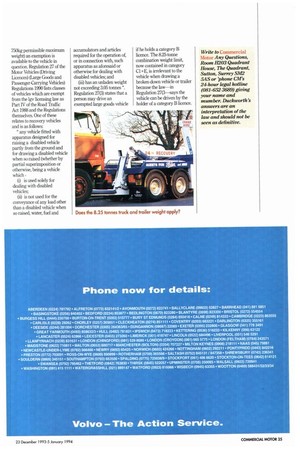Seeking admissions
Page 26

Page 27

If you've noticed an error in this article please click here to report it so we can fix it.
One of our company's vehicles was stopped by the police and sent to a weighbridge where the Trading Standards people weighed the vehicle and told the driver it was overweight.
We received a letter from the same Trading Standards people in which they referred to the Road Traffic Act 1988 and the Road Vehicles (Construction and Use Regulations) 1986 and went on to ask a lot of questions.
They asked who owned the vehicle at the time of the check; who employed the driver; who loaded the vehicle; where was the nearest weighbridge; what instructions have we given to drivers about checking weights and so on We put the letter on one side but after a week the Trading Standards office rang up and said if we did not reply to the letter we would be in trouble and they would ask the police to visit us.
Does the law require us to answer their questions?
I A No, you do not have to 1111 --pond to the letter and it would not be in your best interests to do so.
The request for information received from the Trading Standards office has no legal backing. Neither the Road Traffic Act 1988 nor the Construction and Use Regulations give them power to request information. To prosecute you for an overloading offence Trading Standards have to obtain evidence that the vehicle was being used by your company at the time of the check. Their questions are designed primarily to obtain an admission from your company that it was the user of the vehicle and, if that admission was made the company would simply be providing them with prosecution evidence.
It appears they are also seeking to knock any defence you might raise based on the fact that the vehicle was on its way to the nearest available weighbridge.
Regarding the police, they have no more powers to ask those questions than the Trading Standards and many forces do not follow up these type of inquiries. Even if a local policeman does come to see you about the matter you do not have to make any admissions or answer the kind of questions described.
The burden is on the prosecution to prove its case and you are under no legal duty to provide them with that proof.
Which licence ?
We operate a Ford Cargo recovery truck which is taxed at the £85 a year rate because it deals only with disabled vehicles. Though it is plated for 7.5 tonnes gross weight it has no bodywork (apart from a crane) and weighs only 2,900kg unladen.
Can it be driven by the holder of an ordinary car licence when towing a broken down vehicle or trailer carrying a crashed vehicle too badly damaged to tow ? Does the new limit of 8.25 tonnes truck-and-trailer weight apply to it ?
rikl Yes. Though a licence of 1-111. at least category C would normally be required by the driver of a 7.5 tonne truck towing another vehicle (over 750kg permissible maximum weight) an exemption is available to the vehicle in question. Regulation 27 of the Motor Vehicles (Driving Licences) (Large Goods and Passenger-Carrying Vehicles) Regulations 1990 lists classes of vehicles which are exempt from the lgv licensing law as Part IV of the Road Traffic Act 1988 and the Regulations themselves. One of these relates to recovery vehicles and is as follows: 'any vehicle fitted with apparatus designed for raising a disabled vehicle partly from the ground and for drawing a disabled vehicle when so raised (whether by partial superimposition or otherwise, being a vehicle which (i) is used solely for dealing with disabled vehicles; (ii) is not used for the comreyance of any load other than a disabled vehicle when so raised, water, fuel and accumulators and articles required for the operation of, or in connection with, such apparatus as aforesaid or otherwise for dealing with disabled vehicles; and (ni) has an unladen weight not exceeding 3.05 tonnes' . Regulation 27(3) states that a person may drive an exempted large goods vehicle if beholds a category B licence. The 8.25-tonne combination weight limit, now contained in category Cl+E, is irrelevant to the vehicle when drawing a broken-down vehicle or trailer because the law—in Regulation 27(3—says the vehicle can be driven by the holder of a category B licence.
































































































































